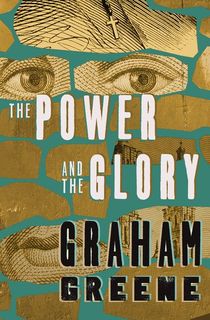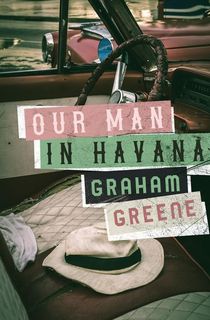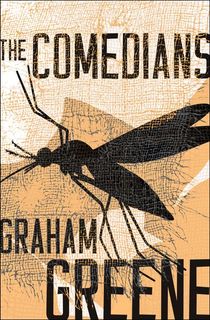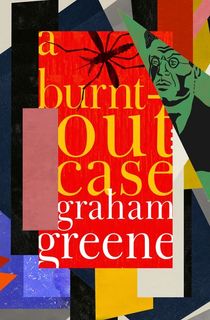“There is a splinter of ice in the heart,” Graham Greene once said, describing the similarity between spies and novelists. Both roles, he argued, require a sort of dispassionate observation of human struggles and tragedy. And if anyone should know, it might have been Greene, who was not only one of England’s most celebrated novelists and a frequent habitué of the Nobel Prize shortlist, but also an intelligence operative for Britain’s MI6 during the Second World War.
Born in Hertfordshire, Greene came from a prominent family whose relatives included bankers, statesmen, and no less a personage than Robert Louis Stevenson himself. Despite this, Greene had an unhappy childhood that was marked by bullying at school and frequent bouts of depression including, as he wrote in his own autobiography, several suicide attempts. Eventually graduating from Oxford, where he had studied history, Greene went on to work as a journalist, novelist, and spy.
As a writer, Greene divided his output between more “serious” literary endeavors, which often dealt heavily with Catholic themes, and what he deemed “entertainments,” which were often stories of travel and espionage. However, the distinction between the two was not always as clear as even Greene probably believed, and many of his themes and obsessions cross-pollinate between his more literary works and his “entertainments.”
A consummate traveler even before his intelligence career, one biographer described Graham Greene as a man who loved “drink, opium, adventure, and beautiful women”—a description which would not have been out of place for many James Bond-style espionage heroes. Greene himself once jokingly laughed off the idea of his ever becoming a priest by saying that, “Chastity would have been beyond my powers.”
Greene’s travels were often undertaken—and sometimes paid for—under the auspices of his journalistic writing. His 1935 trip to Liberia produced the travel book Journey Without Maps, while a 1938 trip to Mexico, undertaken partly to dodge a lawsuit filed by 20th Century Fox when Greene’s review of the 1937 John Ford film Wee Willie Winkie described nine-year-old Shirley Temple as displaying a “dubious coquetry” which appealed to “middle-aged men and clergymen,” helped to inspire The Power and the Glory, which Greene himself considered one of his best and most important novels.
In 1941, while war gripped Europe, Greene was recruited into MI6 by his sister, who was also an agent of that organization. During the war, Greene was stationed in Sierra Leone, and his experiences as an agent both during and after the war would influence much of his writing, especially his screenplay for the legendary 1949 film noir The Third Man. In preparation for the film, he was shown around Vienna, which had been devasted by the war, where he met actress Elizabeth Montagu and Harry Smollett/Peter Smolka, who was then the Central Europe correspondent for The Times and who served in Britain’s Ministry of Information during the war.
Smollett was, it would later turn out, one of a few of Graham Greene’s contacts who was eventually identified as a double agent. While he was working for MI6, Greene’s supervisor was Kim Philby, who would later infamously be revealed as a Russian asset and the most successful member of the notorious “Cambridge Five” spy ring that passed information from the UK to the Soviet Union during the Second World War and during the Cold War that followed.
After passing more than 900 documents to the Russian intelligence services, Philby came under suspicion and ultimately moved on from intelligence work, leaving the country and eventually defecting to the Soviet Union in 1963. Despite this, Greene has been described as remaining “loyal” to his former spymaster, even writing the introduction to Philby’s 1968 memoir, My Silent War.
“He betrayed his country,” Greene wrote in the introduction, “yes, perhaps he did, but who among us has not committed treason to something or someone more important than a country?” According to Greene, “In Philby’s own eyes, he was working for a shape of things to come from which his country would benefit.”
This, among other things, ultimately called Greene’s own loyalties into question—he had also briefly been a member of the Communist Party during his Oxford days—but by then Greene had left the intelligence world behind and had, himself, moved out of England, living first in Antibes, France and then later in Switzerland, where he died and was buried in 1991, at the age of 86.
He left behind a legacy of enduring novels, with some of his best-remembered and most beloved being among those he had deemed “entertainments.” Among the last of these was Our Man in Havana, a black comic satire of espionage which mocks the way that intelligence services trust reports from local informants. Inspired partly by his own intelligence work and partly by trips that he himself had taken to Havana, the 1958 book prefigures the Cuban Missile Crisis of 1962.
While in Cuba, Greene is said to have aided Castro’s revolution by acting as a secret courier, helping to transport warm clothes to the rebels hiding in the hills during the winter. “I admire him for his courage and his efficiency, but I question his authoritarianism,” Greene later said of Castro. “All successful revolutions, however idealistic, probably betray themselves in time,” he later added.
While in Cuba, Greene is said to have aided Castro’s revolution by acting as a secret courier, helping to transport warm clothes to the rebels hiding in the hills during the winter. “I admire him for his courage and his efficiency, but I question his authoritarianism,” Greene later said of Castro. “All successful revolutions, however idealistic, probably betray themselves in time,” he later added.
Greene himself was a notorious contradiction. Describing himself at times as a “Catholic agnostic,” a piece in The Nation once famously laid out some of the many facets of Green, calling him “a stranger with no shortage of calling cards: devout Catholic, lifelong adulterer, pulpy hack, canonical novelist; self-destructive, meticulously disciplined, deliriously romantic, bitterly cynical; moral relativist, strict theologian, salon communist, closet monarchist; civilized to a stuffy fault and louche to drugged-out distraction, anti-imperialist crusader and postcolonial parasite, self-excoriating and self-aggrandizing, to name just a few.”
Just because Greene had largely stopped writing his “entertainments” after 1958, however, doesn’t mean that he didn’t continue to explore similar themes, or that his intelligence work and travels didn’t continue to influence his work. The 1966 novel The Comedians takes place in Haiti during the rule of Francois “Papa Doc” Duvalier and his notorious secret police, the Tontons Macouts. Greene’s own travels in Haiti, where he frequently stayed at the Hotel Oloffson in Port-au-Prince, provided the inspiration for the novel, along with earlier works such as A Burnt-Out Case.
While Greene’s own espionage work was relatively short-lived and plagued with a certain amount of scandal, and while he would later depict the entire intelligence-gathering apparatus with skepticism, it obviously had a major impact on his work and his worldview that continued long after he had left his role at MI6 behind.





